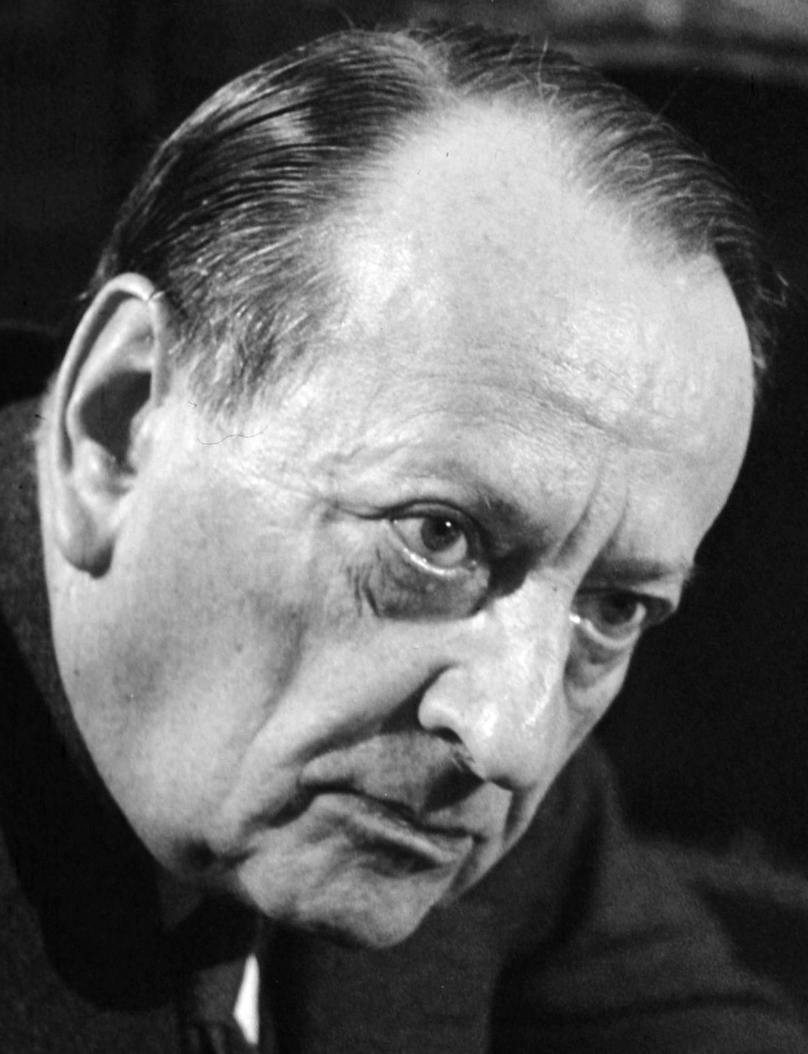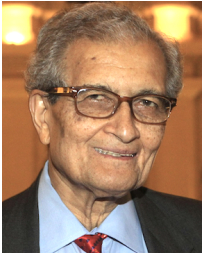November 3
André Malraux

On this date in 1901, writer and freedom fighter Georges André Malraux was born in Paris. His formal education was brief and he traveled to Asia as a young man, becoming a noted critic of French colonial rule in Indochina. He co-founded the Young Annam League and started a newspaper called Indochina in Chains. Malraux was an avowed religious agnostic, although he was once described as obsessed with the divine.
His first novel, The Temptation of the West (1926), was followed by The Conquerors (1928), The Royal Way (1930), Man’s Fate (1934), Days of Hope (1937) and The Walnut Trees of Altenburg (1943). After joining archeological expeditions to Iran and Afghanistan in the 1930s, Malraux co-founded the International Association of Writers for the Defense of Culture. During the Spanish Civil War,he flew on missions for the Republicans and was wounded twice.
During World War II he joined the French Army and was captured in 1940 during the Western offensive, then escaped and joined the French Resistance. In 1944 he was captured by the Gestapo and, following a mock execution, was rescued by the Resistance. He then joined the Free French and fought at Strasbourg and during the takeover of Stuttgart. He was awarded the Medal of the Resistance, the Croix de Guerre and the British Distinguished Service Order.
Gen. Charles De Gaulle appointed Malraux his minister of information in 1945-46. During the 1950s, Malraux wrote about aesthetics and art. After de Gaulle was returned to the presidency in 1958, Malraux served as France’s first minister of cultural affairs until 1968. He survived a 1962 assassination attempt by a right-wing group opposed to Algerian independence. His autobiography, Anti-Memoirs, was published in 1967.
Malraux married twice and had four children. He died of cancer at age 75 and was cremated. (D. 1976)
PHOTO: Malraux in 1974; public domain photo by Roger Pic.
“The attempt to force human beings to despise themselves is what I call hell.”
— Malraux, "La Condition Humaine" (Man's Fate), 1933
Ludovic Kennedy
On this day in 1919, Ludovic Henry Coverly Kennedy, atheist journalist and author, was born to upper-class parents in Edinburgh, Scotland. At age 80, Kennedy (an honorary associate of the National Secular Society) wrote All in the Mind: A Farewell to God, in which he dismissed beliefs on which Christianity was founded as “preposterous.” He was knighted in 1994 by John Major’s government for his services to journalism. Major’s predecessor, Margaret Thatcher, had vetoed Kennedy’s knighthood.
For Kennedy, the “playing fields” of Eton College included a stint in a jazz band. After serving in the Royal Navy in World War II, he attended Christ Church-Oxford before starting work as an investigative reporter. In 1950 he married ballet dancer Moira Shearer, who died in 2006. They had a son and three daughters.
He was known for reexamining cases such as the Lindbergh kidnapping and the murder convictions of Timothy Evans and Derek Bentley and for his role in the abolition of the death penalty in the United Kingdom. Starting in 1953 he edited and introduced the “First Reading” radio series on the BBC. Later he became a news anchor on the public network ITV. He did work for BBC’s “Panorama,” the longest-running current affairs documentary series in the world. It launched in 1953.
He was president and co-founder of the Voluntary Euthanasia Society and in 1990 published Euthanasia: The Case for the Good Death. He died at age 89 of pneumonia in a Salisbury nursing home. (D. 2009)
“In the spring and with the coming of Easter, an old man’s fancy lightly turns to thoughts of gods. I am now 83 pushing 84 and the closer I come to shuffling off this mortal coil, the more mystified I am by Christian belief in the deity they call by the not very original name of God (as if there had never been others).
“All gods from time immemorial are fantasies, created by humans for the welfare of humans and to attempt to explain the seemingly inexplicable. But do we, in the third year of the 21st century of the Common Era and on the springboard of colonising the universe, need such palliatives?
“Wherever one looks there is conflict: Protestants and Catholics in Northern Ireland; Jews, Christians and Muslims in Palestine; Muslims and Hindus in the Indian subcontinent; Christians and Muslims in Nigeria, Indonesia, Saudi Arabia and elsewhere. Is not the case for atheism made?”
— Kennedy in a column titled "Put away childish things," The Guardian (April 17, 2003)
Steven Wilson

On this day in 1967, musician Steven John Wilson was born in the Kingston upon Thames section of London to music-loving parents. His father, an electronic engineer, built him a multi-track tape recorder and a type of synthesizer called a vocoder. Wilson’s first instrument was a guitar but he grew to learn to play others, including keyboards, autoharp, hammered dulcimer and flute. The rock group Porcupine Tree, for which he’s most well-known, started as his solo project in 1987 before disbanding in 2010.
Associated mainly with progressive rock, Wilson’s influences and work as a composer, performer and producer have encompassed genres such as psychedelia, pop, extreme metal, electronic and jazz. He’s worked with groups like King Crimson, Pendulum, Jethro Tull, Yes, Tears for Fears, Roxy Music and Anathema. The Daily Telegraph in 2017 called him “the most successful British artist you’ve never heard of” in that he has avoided mainstream music, an industry he calls “dreadful.”
Wilson has been nominated four times for Grammy Awards, twice with Porcupine Tree, with his collaborative band Storm Corrosion and as a soloist. He was crowned “king of prog rock” in 2015 at the Progressive Music Awards in London. AllMusic.com credits him on 976 different releases as either songwriter, instrumentalist or producer.
Wilson, an atheist, frequently criticizes religion in his songs. His 2017 album “To the Bone” includes the track “People Who Eat Darkness,” which is about living next door to a fundamentalist religious terrorist and being none the wiser. The song “Last Chance to Evacuate Planet Earth” (2001) commented on the disturbing details behind the Heaven’s Gate cult’s mass suicide in 1999. “Prodigal” from Porcupine Tree’s 2003 album “In Absentia” says “I tried to find myself a better way/I got religion but I went astray/They took my money and I lost my faith.”
Wilson is a vegetarian who doesn’t smoke or do recreational drugs and drinks only occasionally. In a 2012 interview he said “a lot of musicians produce fantastic work in their 20s that’s incredibly creative and prolific. By the time they get to 30, they get married and have kids. Suddenly, the music starts to get more predictable. I think that’s because they become focused on other things and the music becomes a job as opposed to being a vocation. That’s never happened to me. I don’t have a family. I’m not interested in having a family. Some people might think that’s very tragic and sad. I don’t. It’s not for me.”
PHOTO: Wilson in Bologna, Italy, in 2019; photo via Shutterstock by Carlo Vergani.
INNERVIEWS: Are you an atheist?
WILSON: I guess I am in some ways your archetypal atheist. I think the whole myth of religion is absolutely absurd. I say this with the caveat that I understand it brings happiness to people who would otherwise be unhappy. There is comfort in it for people who would otherwise be tortured by their own existence and all that stuff. I appreciate those reasons and arguments, but at the end of the day, I'm afraid it's just a silly fairy tale that mankind has dreamed up because of our fear of death. It's as simple as that.— Innerviews online music magazine (2012)
Scott Galloway

On this date in 1964, marketing professor and entrepreneur Scott Galloway was born in New York City. He grew up in California. In a post on his blog No Mercy / No Malice (June 11, 2018), he wrote: “Religion has played almost no role in my life. My parents weren’t religious, and I had no exposure to God until, at age seven, a babysitter told me I had to stand in the corner with my arms raised (like Jesus?) whenever I said “God” in a blasphemous manner (i.e., ever).”
After his parents divorced, he occasionally attended a synagogue with his mother and felt like he “fit in” with westernized Judaism. He accompanied his stepmother to Presbyterian services on some weekend visits to his father’s.
Galloway earned a B.A. in economics in 1987 from the University of California-Berkeley and an M.A. in economics from UCLA in 1992. He worked as a Morgan Stanley fixed income analyst from 1987-89. In 1997 he founded Red Envelope, an early e-commerce site. He started the digital intelligence firm L2, Inc. in 2009. It was acquired in 2017 by the tech research firm Gartner for $155 million.
From 2002 until this writing in 2022, Galloway has been a clinical professor of marketing at New York University’s Stern School of Business, teaching brand strategy, digital marketing and luxury marketing to second-year MBA students and researching emerging technology platforms. He and his wife Beata, a property developer from Germany, have two sons.
He made a $4.4 million gift to UC-Berkeley’s business school in 2017 to fund fellowships for undergraduate and graduate students who come from immigrant families. It was the school’s second-largest gift ever from an MBA alumni.
He has served on the board of directors of Eddie Bauer, The New York Times Company, Gateway Computer, Urban Outfitters and Berkeley’s Haas School of Business. Galloway’s public presentations and TED-style talks called “Winners & Losers” draw wide audiences. His 2019 book “The Algebra of Happiness: Notes on the Pursuit of Success, Love, and Meaning” puts in print some of those ideas.
He has repeatedly called for antitrust intervention to break up Apple, Facebook, Amazon and Google, endorsed Michael Bloomberg’s presidential 2020 candidacy and sought the removal of Twitter CEO Jack Dorsey. At the time, Galloway owned over 330,000 shares of Twitter stock.
“Most agnostics are closeted atheists,” declared Galloway in a 2018 blog. “I don’t know when exactly I turned off religion. My belief, similar to Ricky Gervais’s, is that good people do good things, bad people do bad things, and when you find good people doing really bad things, religion is usually involved. Finding atheism for me was significant, as I learned the core of atheism is not a denial of God, but an acceptance and tolerance of others’ beliefs, including those of us who don’t believe.”
“Similar to 44% of Americans who at some point change their religious status, I pinged from Jewish to agnostic to atheist. Truth is I was never an agnostic, but an atheist, and didn't have confidence to admit it.”
— No Mercy / No Malice blog, "What Is Heaven?" (June 11, 2018)
Amartya Sen

On this date in 1933, Nobel laureate Amartya Kumar Sen, a giant of development economics, was born in Shantiniketan, Bengal, British India. Sen is considered to be a pioneer in several fields of economics, particularly social welfare, gender equity and famine studies. His father was a chemistry professor, and his mother was the daughter of an eminent Sanskritist and scholar.
Sen was educated at an institution founded by freedom fighter, educator and Nobel Prize-winner Rabindranath Tagore, who was responsible for Sen’s first name Amartya, which means immortal or heavenly. Sen helped distribute food relief with his family during the Bengal famine of the 1940s that killed millions. The famine steeled his resolve to work to ensure that such a cataclysm never reoccurred.
He went on to receive a Ph.D. from Cambridge University and has taught at Oxford, Harvard, UC-Berkeley and premier Indian campuses. Sen’s wide-ranging contributions to economics include introducing the notion of human capabilities and championing policies to expand such capabilities. He was a key figure in setting up the U.N.’s Human Development Report to assess how nations meet their populations’ needs.
Sen wrote a groundbreaking study on how 100 million “missing” women (particularly in Asia) are affected by discriminatory gender policies leading to a staggering number of premature deaths. He was awarded the 1998 Nobel Prize in Economics for “his contributions to welfare economics … tied closely together by a general interest in distributional issues and a particular interest in the most impoverished members of society.”
He has staunchly defended the secular foundations of independent India and sharply criticized the Hindu nationalist government, which has gotten him into trouble. He describes himself as an atheist proud to belong to the freethinking tradition within Hinduism. When asked at the Calcutta Press Club if he believed in a god, he replied, “No. I do not believe in god.” (Rediff, Dec. 28, 1998)
Sen and his first wife Nabaneeta Dev, a writer and scholar, wed in 1958. They had two daughters: Antara, a journalist, and Nandana, a Bollywood actress. In 1978 he married Eva Colorni, an Italian economist. They had a daughter, Indrani, a journalist in New York, and a son, Kabir, a hip hop artist and music teacher in Cambridge, Mass. After Eva died of cancer, he married Emma Georgina Rothschild, a Harvard history professor.
Sen has received over 90 honorary degrees from universities around the world.
PHOTO: Sen in 2012 at Fronteiras do Pensamento (Frontiers of Thought) in São Paulo, a cultural project to bring international speakers to Brazil to address contemporary issues. CC 2.0
"I told [my grandfather] that religion did not interest me at all and I had no religious convictions."
— Sen, from "Home in the World: A Memoir" (2020)
